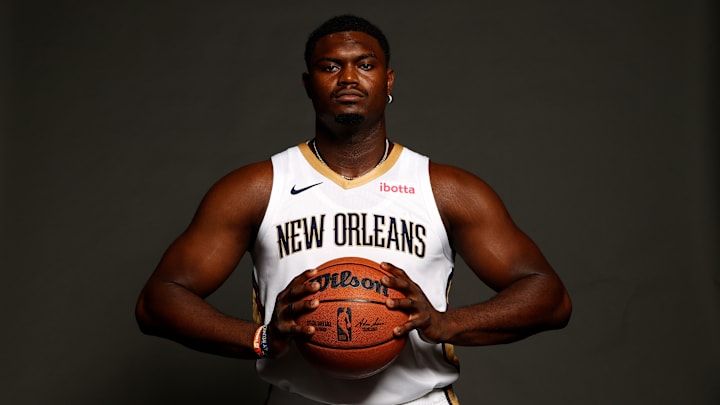Zion Williamson ranked No. 8 on The Step Back's 2023-24 25-under-25, ranking the best young players in the NBA. Check out the rest of the list here.
In any given year, only one NBA team can take home the Larry O'Brien Championship Trophy. But throughout the season, every team has a championship moment -- the high point of their year when the vibes and overall team morale are at their absolute peak.
For the New Orleans Pelicans, that time came during the weekend of Dec. 9 to Dec. 11th. It was then that they pulled off back-to-back home victories against the team that eliminated them from the playoffs in the previous season – extending their win streak to seven games and improving their record to 18-8 in the process.
The headliner of these wins was none other than the subject of this installment of 25-under-25, Zion Williamson. For two games, the former first-overall pick bruised and battered the Phoenix Suns' interior defense en route to 35 points per game on a 75.5 true shooting percentage.
High-volume, high-efficiency interior scoring like this became the hallmark feature of Williamson’s fourth season in the NBA. In 2022-23, Williamson finished in the 96th percentile in scoring volume and 92nd percentile in scoring efficiency (per thinkingbasketball.net) while also finishing in the 100th percentile in rim attempts per 75 possessions (per Dunks & Threes).
Six days after what would later be recognized as the pinnacle of their season, the Pelicans traveled to Phoenix. Unfortunately, they couldn’t make it three straight against their Western Conference rivals, falling 118-114. But Williamson did pitch another impressive outing, scoring 30 points on an 83 true shooting percentage.
What’s more, this time, he also handed out nine assists, compared to just seven total in his first two games. The main reason he was able to dish out so many more dimes is the same reason he ranks so high on our list: his interior gravity. Williamson is such a prolific paint presence that defenses have to completely warp their coverage in order to stop him from getting to the rim. Like this:
Williamson demands so much extra attention that he’s able to create a high quantity of open looks for his teammates. According to Ben Taylor’s Box Creation metric (a statistic that estimates the number of shots a player creates for his teammates per 100 possessions), Williamson creates 7.9 shots for his Pelican pals per 100 possessions (86th percentile).
Most of you reading this can guess why a December stretch was the best part of the Pelicans’ season. A few weeks later, Williamson suffered a strained hamstring that caused him to miss the final 45 games of the season and subsequently took the Pelicans from the top of the conference to fringe play-in contender status.
It was a very depressing ending to what started as a promising season, but it also illustrates the cataclysmic impact that Williamson has on the game. With Williamson, New Orleans had one of the most high-powered offenses in the league – one predicated on blitzing the most sacred area of the floor (the paint). And without him, their shot diet (and, by extension, their offense as a whole) looked like the one you’d see from a team with lottery aspirations. To understand the “Zion effect,” take a look at the Pelicans’ shot profile before and after Williamson’s season-ending injury.
New Orleans Pelicans offense before vs. after Zion Williamson's injury
DATE | RECORD | ORTG | RIM FREQ. | MIDRANGE FREQ. | 3PT FREQ. | LOCATION eFG% |
|---|---|---|---|---|---|---|
Pre-Jan. 3 | 23-14 | 7th | 1st | 20th | 28th | 3rd |
Post-Jan. 3 | 19-26 | 25th | 22nd | 5th | 27th | 28th |
*Data Provided by Cleaning the Glass
When Williamson was healthy, the Pelicans were gaining access to the most efficient live-ball shot more than anyone else in the association. After he went down, those rim attempts got exchanged for midrange jumpers, and their offense cratered as a result.
Arguably, the best statistic for measuring a team’s shot diet is Cleaning the Glass’ Location effective field goal percentage, which measures a team’s effective field goal percentage if they shot the league average from every area of the floor. As you can see from the chart above, their standing in this measure does a complete 360 after Jan. 3 (the day after Williamson’s injury).
Like we said, at 23, Williamson is already an elite offensive force. However, there is another gear he can still hit. He has the chance to be the best offensive player on the planet someday. And to do that, the next step will involve him growing more as a passer.
Along with his Box Creation statistic, Taylor also created a tool known as Passer Rating, which estimates a player’s passing ability on a scale of 1-10. Of all the players with a Box Creation of 7.5 or higher, Williamson had the lowest Passer Rating (3.9, 32nd percentile).
Passer Rating v. Box Creation 2022-23*

*Data/Graph Provided by Thinking Basketball
The fact that Williamson managed to create as many shots as he did despite his limitations as a passer is a testament to his potential as a playmaker. If he can level up his passing in 2023-24, there’s a good chance he goes from being a mid-80th percentile playmaker to one of the very best in the entire league.
One of the very best in the league; that’s what a fully realized version of Williamson can ultimately be for the Pelicans. To do that, he’ll first need to stay healthy, which will require him to take better care of his body. Doing that will, in turn, make him a better defender. And if he compounds that with some passing improvement, oh, brother. Let’s just say, if all that happens, the high point of the Pelicans 2023-24 season won’t be happening before Christmas. It’ll take place in late Spring.
